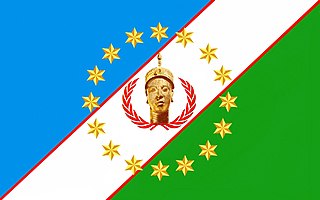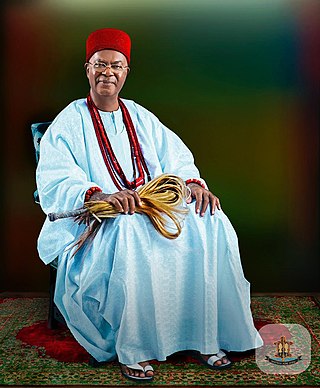Related Research Articles

Samuel Crowther was a Yoruba linguist, clergyman, and the first African Anglican bishop of West Africa. Born in Osogun, he and his family were captured by Fulani slave raiders when he was about twelve years old. This took place during the Yoruba civil wars, notably the Owu wars of 1821–1829, where his village Osogun was ransacked. Ajayi was later on resold to Portuguese slave dealers, where he was put on board to be transported to the New World through the Atlantic.
Melville Jean Herskovits was an American anthropologist who helped to first establish African and African Diaspora studies in American academia. He is known for exploring the cultural continuity from African cultures as expressed in African-American communities. He worked with his wife Frances (Shapiro) Herskovits, also an anthropologist, in the field in South America, the Caribbean and Africa. They jointly wrote several books and monographs.
Nigerian Americans are Americans who are of Nigerian ancestry. The number of Nigerian immigrants residing in the United States is rapidly growing, expanding from a small 1980 population of 25,000. The 2022 American Community Survey (ACS) estimated that 712,294 residents of the US were of Nigerian ancestry. The 2019 ACS further estimated that around 392,811 of these (85%) had been born in Nigeria. This puts the American-born Nigerian American population a little over 400,000. Similar to its status as the most populous country in Africa, Nigeria is also the African country with the most migrants to the US, as of 2013. In a study which was carried out by consumer genetics company 23andMe which involved the DNA of 50,281 people of African descent in the United States, Latin America, and Western Europe, it was revealed that Nigeria was the most common country of origin for testers from the United States, the French Caribbean, and the British Caribbean.

The history of the territories which since ca. 1900 have been known under the name of Nigeria during the pre-colonial period was dominated by several powerful West African kingdoms or empires, such as the Oyo Empire and the Islamic Kanem-Bornu Empire in the northeast, and the Igbo kingdom of Onitsha in the southeast and various Hausa-Fulani kingdoms.

Colonial Nigeria was ruled by the British Empire from the mid-nineteenth century until 1 October 1960 when Nigeria achieved independence. Britain annexed Lagos in 1861 and established the Oil River Protectorate in 1884. British influence in the Niger area increased gradually over the 19th century, but Britain did not effectively occupy the area until 1885. Other European powers acknowledged Britain's dominance over the area in the 1885 Berlin Conference.
Laura Bohannan, pen name Elenore Smith Bowen, was an American cultural anthropologist best known for her 1966 article, "Shakespeare in the Bush." Bohannan also wrote two books during the 1960s, Tiv Economy, with her husband, and Return to Laughter, a novel. These works were based on her travels and work in Africa between 1949 and 1953.

The African Studies Association (ASA) is a US-based association of scholars, students, practitioners, and institutions with an interest in the continent of Africa. Founded in 1957, the ASA is the leading organization of African Studies in North America, with a global membership of approximately 2000. The association's headquarters are at Rutgers University in New Jersey. The ASA holds annual conferences and virtual events for its members year-round.

The Yoruba people are a West African ethnic group who mainly inhabit parts of Nigeria, Benin, and Togo. The areas of these countries primarily inhabited by the Yoruba are often collectively referred to as Yorubaland. The Yoruba constitute more than 50 million people in Africa, are over a million outside the continent, and bear further representation among members of the African diaspora. The vast majority of the Yoruba population is today within the country of Nigeria, where they make up 20.7% of the country's population according to Ethnologue estimations, making them one of the largest ethnic groups in Africa. Most Yoruba people speak the Yoruba language, which is the Niger-Congo language with the largest number of native or L1 speakers.

Toyin Omoyeni Falola is a Nigerian historian and professor of African Studies. Falola is a Fellow of the Historical Society of Nigeria and of the Nigerian Academy of Letters, and has served as the president of the African Studies Association. He is currently the Jacob and Frances Sanger Mossiker Chair in the Humanities at the University of Texas at Austin.

Mahmood Mamdani, FBA is an Indian-born Ugandan academic, author, and political commentator. He currently serves as the Chancellor of Kampala International University, Uganda. He was the director of the Makerere Institute of Social Research (MISR) from 2010 until February 2022, the Herbert Lehman Professor of Government and a Professor of Anthropology, Political Science and African Studies at Columbia University.

Oyèrónkẹ́ Oyěwùmí is a Nigerian gender scholar and full professor of sociology at Stony Brook University. She acquired her bachelor's degree in political science at the University of Ibadan in Ibadan, Nigeria and went on to pursue her graduate degree in Sociology at the University of California, Berkeley. Oyěwùmí is the winner of the African Studies Association's 2021 Distinguished Africanist Award, which recognizes and honours individuals who have contributed a lifetime of outstanding scholarship in African studies combined with service to the Africanist community.
Yoruba Americans are Americans of Yoruba descent. The Yoruba people are a West African ethnic group that predominantly inhabits southwestern Nigeria, with smaller indigenous communities in Benin and Togo.

The Saro, or Nigerian Creoles of the 19th and early 20th centuries, were Africans that were emancipated and initially resettled in Freetown, Sierra Leone by the Royal Navy, which, with the West Africa Squadron, enforced the abolition of the international slave trade after the British Parliament passed the Slave Trade Act 1807. Those freedmen who migrated back to Nigeria from Sierra Leone, over several generations starting from the 1830s, became known locally as Saro(elided form of Sierra Leone, from the Yoruba sàró). Consequently, the Saro are culturally descended from Sierra Leone Creoles, with ancestral roots to the Yoruba people of Nigeria.

James Pinson Labulo Davies was a Nigerian businessman, merchant-sailor, naval officer, farmer, pioneer industrialist, statesman, and philanthropist who married Sara Forbes Bonetta in colonial Lagos.
Sara Sweezy Berry is an American scholar of contemporary African political economies, professor of history at Johns Hopkins University and co-founder of the Center for Africana Studies at Johns Hopkins.
Dame Karin Judith Barber, is a British cultural anthropologist and academic, who specialises in the Yoruba-speaking area of Nigeria. From 1999 to 2017, she was Professor of African Cultural Anthropology at the University of Birmingham. Before joining the Centre of West African Studies of the University of Birmingham, she was a lecturer at the University of Ife in Nigeria. Since 2018, she has been Centennial Professor of Anthropology at the London School of Economics.

Olufemi O. Vaughan is a Nigerian academic whose research and teaching focuses on African Political and Social History, African Politics, Diaspora Studies, African Migrations and Globalization, Religion and African States. He is currently the Alfred Sargent Lee '41 and Mary Ames Lee Professor of African Studies at Amherst College, Amherst, Massachusetts.
The word Nagos refers to all Brazilian Yoruba people, their African descendants, Yoruba myth, ritual, and cosmological patterns. Nagos derives from the word anago, a term Fon-speaking people used to describe Yoruba-speaking people from the kingdom of Ketu, Toward the end of the slave trade in the 1880s, the Nagos stood out as the African group most often shipped to Brazil. The Nagos were important to the history of the slave trade at that time in the 19th century, as Brazil requested more enslaved persons as demand for products from this region grew and harsh conditions on plantations entailed a high turnover.

The social structure in Nigeria is the hierarchical characterization of social status, historically stratified under the Nigerian traditional rulers and their subordinate chiefs, with a focus on tribe and ethnicity which continued with the advent of colonization.
Allen Isaacman is an American historian specializing in the social history of Southern Africa. He is a Regents Professor of History at the University of Minnesota. In 2015, he was inducted into the American Academy of Arts and Sciences.
References
- ↑ ASA President Jean Allman delivers the 2018 Presidential Lecture, #HerskovitsMustFall? A Meditation on Whiteness, African Studies, and the Unfinished Business of 1968, at the 61st Annual Meeting of the ASA, held at the Atlanta Marriott Marquis, Nov. 29-Dec. 1, 2018.
- ↑ "Van Onseln and Mamdani Share 1997 Herskovitz Award" (PDF). ASA News. 31. African Studies Association: 9. January 1997.
- ↑ African Studies Review [@ASRJournal] (November 22, 2022). "Congratulations to @profiheka on a well deserved ASA Best Book Award win" (Tweet). Retweeted by @ASANewsOnline – via Twitter.
- ↑ "2023 ASA Award Winners". African Studies Association (ASA). Retrieved 1 January 2024.
- ↑ "2024 ASA Award Winners". African Studies Association (ASA). Retrieved 24 December 2024.